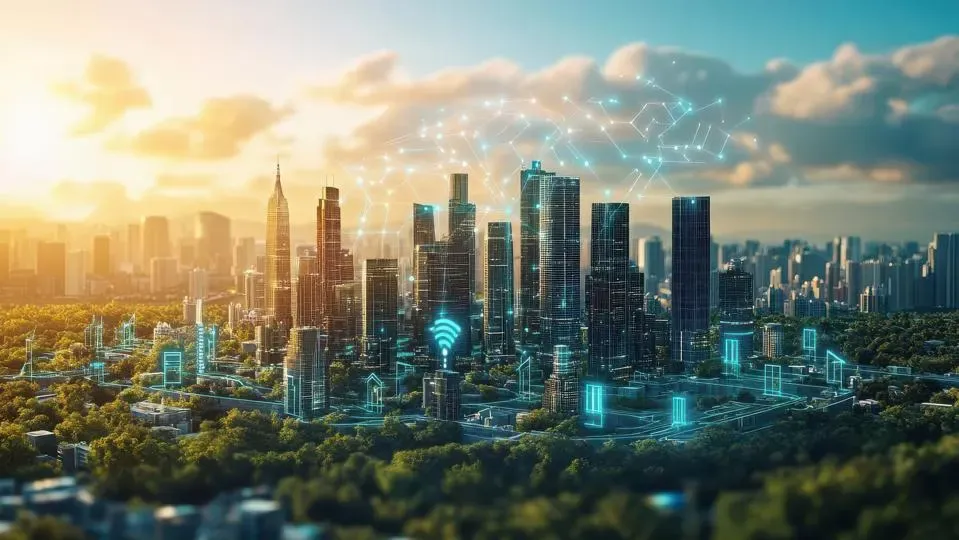

In the rapidly evolving landscape of urban development, artificial intelligence (AI) is playing an increasingly pivotal role in shaping the future of our cities. From enhancing infrastructure to improving quality of life, AI is revolutionizing the way we live, work, and interact in urban environments. Let’s learn more about this topic below with 2048 Unblocked.
Smart cities are urban areas that leverage technology and data to enhance the quality and performance of urban services, reduce costs and resource consumption, and engage more effectively with citizens. At the heart of this transformation lies artificial intelligence, which serves as the brain behind countless smart city initiatives.
AI-powered systems are capable of processing vast amounts of data collected from various sources such as sensors, cameras, and connected devices. This data is then analyzed to provide valuable insights that can be used to optimize city operations, improve public services, and enhance overall urban living experiences.
One of the key advantages of AI in smart cities is its ability to learn and adapt. Machine learning algorithms can identify patterns and trends in urban data, allowing city planners and administrators to make more informed decisions and predict future needs. This proactive approach to urban management can lead to more efficient resource allocation, reduced waste, and improved sustainability.
The integration of AI into urban infrastructure is transforming the way cities function on a fundamental level. From traffic management to energy distribution, AI is optimizing various aspects of city operations.
AI is revolutionizing urban mobility by creating more efficient and sustainable transportation networks. Smart traffic management systems use AI algorithms to analyze real-time traffic data and adjust signal timings to reduce congestion and improve traffic flow. These systems can also predict traffic patterns and suggest alternative routes to drivers, helping to alleviate bottlenecks and reduce travel times.
Public transportation is also benefiting from AI integration. Predictive maintenance algorithms can analyze data from sensors on buses and trains to identify potential issues before they cause breakdowns, reducing downtime and improving reliability. AI-powered route optimization can help transit agencies design more efficient bus and train schedules, better serving commuters and reducing operational costs.
Smart cities are leveraging AI to create more sustainable and energy-efficient urban environments. AI-driven energy management systems can analyze consumption patterns and optimize distribution, reducing waste and lowering costs. These systems can also integrate renewable energy sources more effectively, balancing supply and demand to create a more resilient and eco-friendly power grid.
In buildings, AI-powered smart systems can automatically adjust lighting, heating, and cooling based on occupancy and environmental conditions, significantly reducing energy consumption. On a larger scale, AI can help city planners design more energy-efficient urban layouts, taking into account factors such as sunlight exposure and natural ventilation to reduce the overall energy footprint of the city.
Read more: Can AI Help Solve Climate Change Problems
Artificial intelligence is playing a crucial role in improving public safety and security in smart cities. AI-powered surveillance systems can analyze video feeds in real-time, identifying potential security threats or criminal activities. These systems can also assist in crowd management during large events, helping to prevent dangerous situations from arising.
Predictive policing is another area where AI is making a significant impact. By analyzing historical crime data and identifying patterns, AI algorithms can help law enforcement agencies allocate resources more effectively and prevent crimes before they occur. However, it’s important to note that the use of such technologies raises ethical concerns regarding privacy and potential biases, which must be carefully addressed.
Emergency response systems are also being enhanced by AI. Machine learning algorithms can analyze emergency calls and other data sources to predict and detect emergencies more quickly, allowing first responders to react faster and more efficiently. AI can also assist in coordinating response efforts during large-scale emergencies or natural disasters, optimizing resource allocation and potentially saving lives.
Beyond infrastructure and safety, AI is also being used to enhance the overall quality of life for city dwellers in numerous ways.
AI is transforming urban healthcare systems, making them more efficient and accessible. Telemedicine platforms powered by AI can provide initial diagnoses and triage patients, reducing the burden on healthcare facilities and improving access to medical care. AI algorithms can also analyze health data from wearable devices and environmental sensors to identify potential health risks and provide personalized wellness recommendations.
In the context of public health, AI can be used to predict and monitor disease outbreaks, allowing health authorities to respond more quickly and effectively. During the COVID-19 pandemic, for example, AI played a crucial role in contact tracing and predicting virus spread patterns in urban areas.
Smart cities are using AI to revolutionize education and skill development. Adaptive learning platforms powered by AI can personalize educational content based on individual student needs, helping to improve learning outcomes. Virtual and augmented reality technologies, enhanced by AI, can create immersive learning experiences that make education more engaging and effective.
Furthermore, AI-driven career guidance systems can analyze job market trends and individual skills to provide personalized recommendations for career development and training opportunities. This can help bridge the skills gap in urban economies and ensure that residents are prepared for the jobs of the future.
As smart cities evolve, the integration of AI into individual homes is becoming increasingly important. AI-powered smart home systems can learn residents’ preferences and habits, automatically adjusting settings for optimal comfort and energy efficiency. These systems can also integrate with city-wide networks, allowing for more efficient resource management at both the individual and community levels.
Voice-activated virtual assistants, powered by natural language processing AI, are becoming central hubs for smart home control. These assistants can manage everything from lighting and temperature to security systems and appliances, making daily life more convenient and efficient for urban residents.
While the potential benefits of AI in smart cities are immense, there are also significant challenges and ethical considerations that must be addressed.
The vast amount of data collected in smart cities raises serious concerns about privacy and security. AI systems require large amounts of data to function effectively, but this data often includes sensitive personal information. Ensuring that this data is collected, stored, and used ethically and securely is a major challenge for smart city planners and policymakers.
Robust data protection regulations and transparent data governance frameworks are essential to maintain public trust in smart city initiatives. Cities must also invest in robust cybersecurity measures to protect against data breaches and cyberattacks, which could have devastating consequences in highly connected urban environments.
As cities become increasingly reliant on digital technologies and AI, there is a risk of exacerbating existing inequalities. Not all residents may have equal access to or understanding of these technologies, potentially leading to a digital divide. Smart city initiatives must prioritize inclusivity, ensuring that the benefits of AI and other technologies are accessible to all residents, regardless of their socioeconomic status or technical literacy.
AI systems are only as unbiased as the data they are trained on and the people who design them. There is a risk that AI algorithms used in smart cities could perpetuate or even amplify existing biases related to race, gender, or socioeconomic status. Ensuring fairness and transparency in AI systems is crucial to prevent discrimination and maintain public trust.
Read more: What Is Quantum Computing and Why It Matters
As AI technology continues to advance, its role in shaping urban life is likely to expand even further. Some emerging trends and potential future developments include:
The widespread adoption of autonomous vehicles could revolutionize urban transportation, potentially reducing traffic congestion, improving safety, and changing the very layout of our cities. AI-powered drones could be used for everything from package delivery to infrastructure inspection and emergency response.
As AI systems become more sophisticated and have access to more data, their predictive capabilities will improve dramatically. This could lead to highly accurate forecasting of everything from energy demands to crime patterns, allowing cities to become more proactive in addressing challenges.
AI could play an increasingly important role in urban planning and design. By analyzing vast amounts of data on how people use city spaces, AI systems could help create more efficient and livable urban environments tailored to the needs of residents.
The convergence of AI with other emerging technologies such as 5G networks, the Internet of Things (IoT), and blockchain could create new opportunities for smart city innovation. For example, AI combined with IoT sensors and 5G connectivity could enable real-time, city-wide optimization of resources and services.
In conclusion, artificial intelligence is reshaping urban life in profound ways, offering solutions to many of the challenges faced by modern cities.